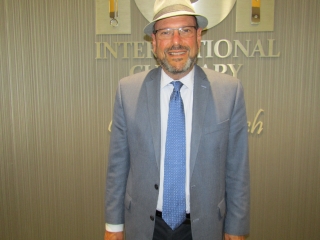
There is No Such Thing as a Free Lunch: The Opportunity Cost of Corn
01 December 2022Teaching students their decisions on something as basic as what to make for dinner has short- and long-term impacts.
By Adam Weiner, JD, CFSE, and Stephanie Weiner, BA
Feedback & comments: This email address is being protected from spambots. You need JavaScript enabled to view it.
Last month’s street taco story touched on corn and its environmental impacts. Corn is an interesting commodity in the United States in that it is used for a wide range of purposes including, but certainly not limited to:
- Food for people
- Food for animals, including cows, sheep, horses, goats, ducks and turkeys
- Vegetable oil
- A fuel for powering everything from farm equipment to cars
- Medications and pharmaceutical products
- Cosmetics
- Soap and cleaning products
- High fructose syrup, which is a sugar widely used in the foodservice industry
Monocropping was also discussed in the previous article. As a reminder, monocropping is the large-scale planting of a single crop, year after year, on the same land without crop rotation.
For culinary purposes, monocropping and corn farming are economic and environmental concerns. We hope your students will begin to understand from your discussions concerning these topics that their decisions on what they make and the ingredients they cook with have an impact on the current and future environment.
Let’s start with the economic connection. (Click here to read a 50 Minute Classroom article about concurrent teaching. Do your school’s economics classes cover this topic?)
Opportunity cost is among the first economic lesson taught in a class. What this means is if you decide to do one thing, there will automatically be other things you cannot do. It is often referred to as, “There is no such thing as a free lunch.” For example, if I am invited as a guest to lunch, the lunch isn’t free. I might not be paying cash, but I have given up the opportunity of entering grades, attending a meeting, or catching up on paperwork.
How does this apply to corn? Corn is used to produce ethanol, an arguably cleaner fuel than fossil fuel. When corn produces ethanol, the same corn can’t feed animals and that has price repercussions depending on when and what the animals are fed. If corn is used for ethanol, the same corn can’t be eaten by people. For many people around the world, this means they have lost a substantial portion of their food intake.
Let’s now discuss corn’s other environmental concern: that of monocropping. As a historical point, the Dust Bowl of the 1930s was partially caused by monocropping. Here we are nearly 100 years later and it’s still an issue. Monocropping yields more of the same crop over time than other farming methods. For example, if a farmer is monocropping corn in 10 years the farmer will get far more corn than if he or she applied other farming practices. However, the environmental issues of monocropping include:
- Decreased soil quality leads to an increase in fertilizer use. Overuse of fertilizer has been linked to eutrophication and ocean dead zones. Eutrophication is when excess nutrients are added to an aquatic ecosystem resulting in an algae bloom that depletes the water of oxygen-- leading to mass die offs.
- Soil is also remarkably good at absorbing CO2. This absorption is negatively affected by monocropping and the frequent tilling associated with it. This can turn the soil from a carbon absorber into a carbon producer.
- Monocropping also leads to increased vulnerability to pests and diseases. A historical example would be the Great Irish Potato Famine. Because of this, monocropping also includes increased use of pesticides and herbicides which can negatively impact food chains.
We are providing culinary educators with this information to help teach their students to understand their decisions on something so basic as what to make for dinner has short- and long-term impacts. Impacts that spread beyond themselves and go to their families, the people in their communities, the people in the United States and quite likely people around the world.
Also, here are the corn bingo and scavenger hunt games promised in last month’s article.
Adam Weiner, JD, CFSE, has been a culinary instructor in the San Francisco Bay Area for more than 17 years.
